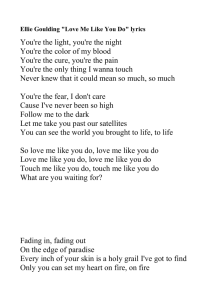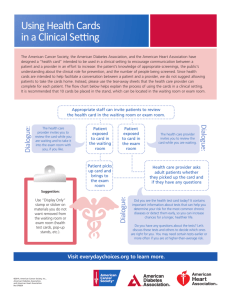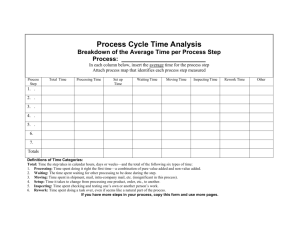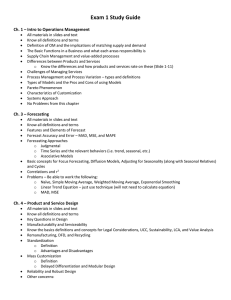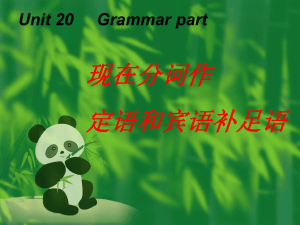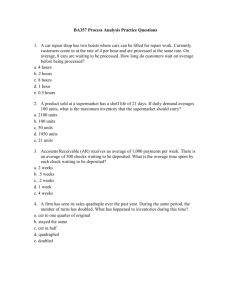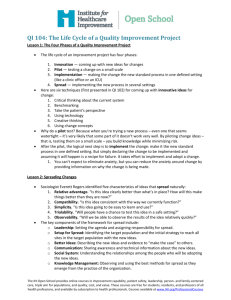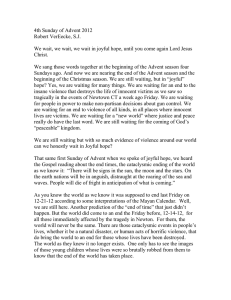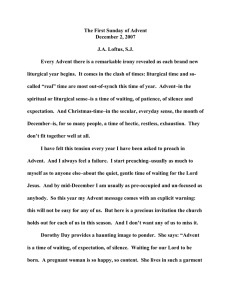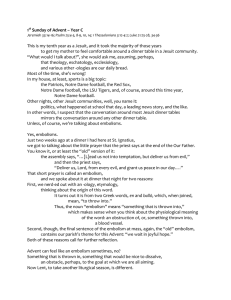Advent means waiting-Claire Smith Reflection
advertisement
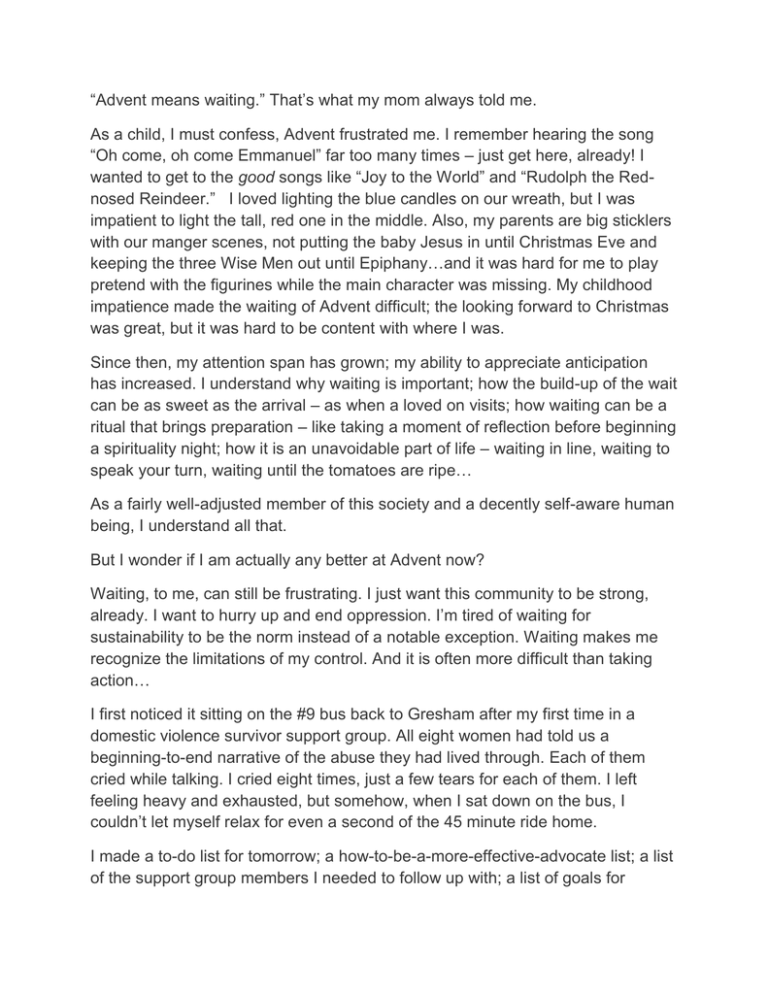
“Advent means waiting.” That’s what my mom always told me. As a child, I must confess, Advent frustrated me. I remember hearing the song “Oh come, oh come Emmanuel” far too many times – just get here, already! I wanted to get to the good songs like “Joy to the World” and “Rudolph the Rednosed Reindeer.” I loved lighting the blue candles on our wreath, but I was impatient to light the tall, red one in the middle. Also, my parents are big sticklers with our manger scenes, not putting the baby Jesus in until Christmas Eve and keeping the three Wise Men out until Epiphany…and it was hard for me to play pretend with the figurines while the main character was missing. My childhood impatience made the waiting of Advent difficult; the looking forward to Christmas was great, but it was hard to be content with where I was. Since then, my attention span has grown; my ability to appreciate anticipation has increased. I understand why waiting is important; how the build-up of the wait can be as sweet as the arrival – as when a loved on visits; how waiting can be a ritual that brings preparation – like taking a moment of reflection before beginning a spirituality night; how it is an unavoidable part of life – waiting in line, waiting to speak your turn, waiting until the tomatoes are ripe… As a fairly well-adjusted member of this society and a decently self-aware human being, I understand all that. But I wonder if I am actually any better at Advent now? Waiting, to me, can still be frustrating. I just want this community to be strong, already. I want to hurry up and end oppression. I’m tired of waiting for sustainability to be the norm instead of a notable exception. Waiting makes me recognize the limitations of my control. And it is often more difficult than taking action… I first noticed it sitting on the #9 bus back to Gresham after my first time in a domestic violence survivor support group. All eight women had told us a beginning-to-end narrative of the abuse they had lived through. Each of them cried while talking. I cried eight times, just a few tears for each of them. I left feeling heavy and exhausted, but somehow, when I sat down on the bus, I couldn’t let myself relax for even a second of the 45 minute ride home. I made a to-do list for tomorrow; a how-to-be-a-more-effective-advocate list; a list of the support group members I needed to follow up with; a list of goals for myself; a list of friends/family to write to this week; a list of things to bring up in our next community meeting…. And when I exhausted my list-making ideas, I immediately opened my book and started reading about Food Justice for the rest of the ride, absorbing someone else’s ideas and information instead of taking a moment to sift through my own. Later, at dinner with my community, I told a brief version of my day, honestly saying that it was hard to hear all of these awful stories but not dwelling on the details of what I heard or what I felt; everyone listened attentively and fully; and then I quickly switched my mind to listen to others’ days and focused on our community relationship. That night, I read up until the moment that my eyes got too heavy; then I quickly fell asleep. My days have followed this pattern often since beginning in my placement. Switching from task to task, hopping from one emergent case to another, trying to learn everything at once, and even in downtime to be constantly pushing one thought after another through my mind. It may not sound like a very frenzied lifestyle – after all, I was sitting on the bus, eating dinner with housemates, sleeping and eating normally, and even having time to read a lot. But going from one activity to another, from one idea to another, has meant that I was lacking an internal stillness. Some days after leaving UNICA, I feel like a big pot of liquid experience is boiling inside of me. Being still, really still, is like turning up the heat until it boils over, making a huge mess. It can be so much easier to keep running around the house and stay out of the kitchen – physically when possible, mentally at all times. I know this is not very Ignation of me; JVC Northwest has fully encouraged reflection since day one. But there is so much to DO this year. Take action. Make positive changes happen in the world. Live out beliefs. Refine understandings. Build community. Be fundamentally changed. That’s a lot to get done; a lot of things that I believe in. So it gives me a sense of control to head out the door running and leave the waiting behind. I finally recognized this was happening when I found this quote by Thomas Merton: “To allow ourselves to be carried away by a multitude of conflicting concerns, to surrender to too many demands, to commit oneself to too many projects, to want to help everyone in everything…is to succumb to violence. The frenzy of our activism neutralizes our work for peace. It destroys our own inner capacity for peace. It destroys the fruitfulness of our own work because it kills the root of inner wisdom which makes work fruitful.” Activity for the sake of activity gets us nowhere. Running full-steam-ahead for an end to domestic violence will never be fruitful if I can’t take a moment after hearing these women’s stories to think about what these experiences mean for them, for me, and for our culture – I might be running in the wrong direction. A hurry-up-and-bond mentality won’t create the deep relationships that a community requires. In fact, according to Merton, it is violence! As I am coming to understand Advent this year, it is about slowing down enough to wait and see the presence of God with us. It is not a stagnant, passive waiting; not an excuse for apathy or inaction. It is an active waiting. An expectation. In Spanish, the word for “to wait” means simultaneously “wait,” “hope” and “expect” – esperar. Three meanings layered into one whispering verb. It is an active stillness. It is perhaps paying attention as the internal pot boils over. To see what happens and to make an empty space – an inner capacity for peace – that can be filled with less turbulent waters of God’s presence.
